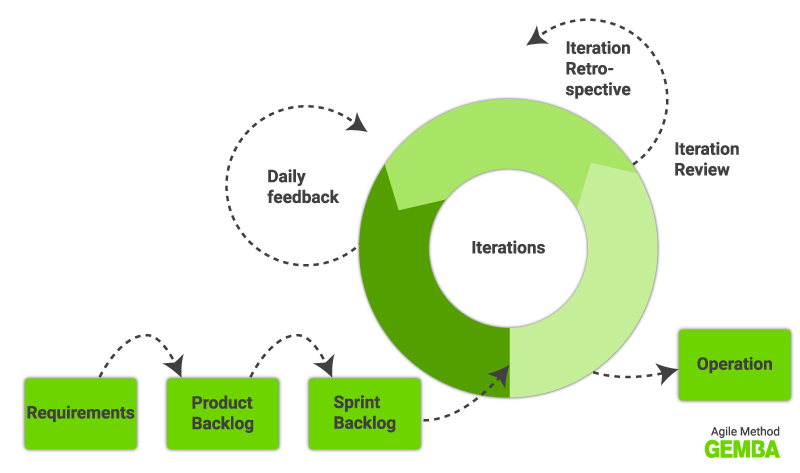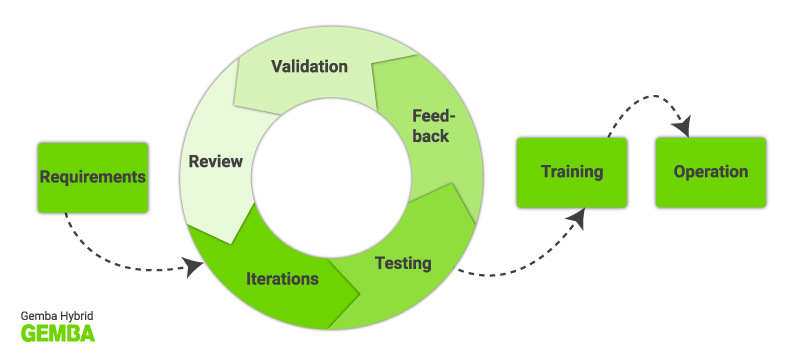Project management methods
Every company is different, as Gemba knows better than anyone. Gemba has used three project methodologies over the past 20 years, and each one has proven itself in practice. Whichever methodology we use, each enables us to work with you on devising the method that best suits your needs, objectives and corporate culture during the exploratory phase (quotation phase).
These three methodologies are:
• Waterfall methodology
• Agile methodology
• Gemba Hybrid
Waterfall methodology
The objective of the Waterfall method is to take care of everything for the customer. We take over the implementation of the project, from start to finish. The customer’s input is only required during the design phase at the start, and the test phase at the end.
The process starts with a kick-off session, during which we explain in detail who we are, what we do, and how we intend to approach the project as a whole. We also clearly discuss what is expected from who during the entire process.
The next phase is the design phase, where we prepare a design document that sets out how we will arrange the infrastructure and software. After the design phase, the document is presented to the customer, who signs it off. This is followed by implementation and then testing. When everything has been successfully completed, the project goes live.
The advantages in brief:
- Complete shouldering of all the burdens
- Ideal for organisations with limited resources
- A complete overview of the required budget is available at the start of the project
- You are kept constantly informed by periodic progress reports
Agile methodology
Modern Agile methodology is centred around involvement and responding to ongoing insights and solutions. The customer has to devote more time with this method, not least by supplying a product owner among other things. This increases the involvement in every aspect of the process.
The Agile method starts with a session prioritising an agile backlog, during which the wishes and requirements of the customer are paramount. During the following phases (sprints), it is decided in consultation with each other, what wishes and requirements are to be implemented at that particular time (continuous delivery). The customer and Gemba form the project team together, which subsequently deals with the configuration of the software. The customer usually handles the process-related part in this team, while Gemba deals with the features-content part.
This is always based on the premise that a usable product is created after each sprint. This is repeated until the customer is satisfied that the product meets the wishes and requirements that were established at the outset.
The advantages in brief:
- Extensive customer involvement in decision making
- The Agile method makes it possible to anticipate evolving insights and requirements that arise while the project is ongoing
- You are always kept informed by daily stand-ups and sprint reviews
The Gemba Hybrid
The Gemba Hybrid project method combines the best of both worlds, and basically means ‘involvement when necessary, shouldering the burden when possible’. The hybrid approach borrows from the other two methods described above, fusing shouldering the burden and involvement into an effective approach.
Phases such as the installation of the infrastructure and software are carried out by Gemba, with minimal support from the customer. Other phases, such as configuration of the software, are executed through iterations in close collaboration with the customer. An iteration consists of a brief customer workshop where the wishes and requirements for the specific subject are made known. Gemba then makes an initial set-up, which is validated by the customer with flexibility for further insights, and concluded with completion of the iteration in question. This is followed by the test and acceptance phase, and finally going live.
The advantages in brief:
- Involvement when necessary, shouldering the burden when possible
- Flexible project management tailored to the needs of your business
- You are kept constantly informed by periodic progress reports
- Monitoring of fixed budgets possible
Why Gemba?
Gemba has more than 20 years of experience with a variety of businesses; as a result, we are the absolute specialist in the field of asset and maintenance management. We’re the largest IBM Maximo implementer in the Netherlands, and uniquely placed to turn your needs into reality, resulting in lower outlay and bigger returns.
If you’d like to know more about our project management service and the project method that suits your business, please contact us directly for more information; we’ll be only too pleased to help.



